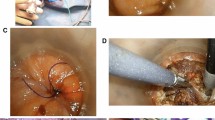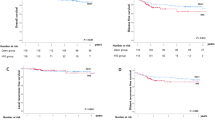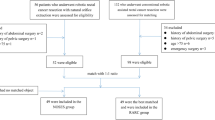Key Points
-
Laparoscopy for colon cancer resection is a widely practiced minimally invasive or minimal access surgery (MAS) technique
-
MAS techniques have been shown to be oncologically equivalent to open rectal cancer resection in terms of the number of harvested lymph nodes and margin negativity
-
Barriers such as a steep learning curve and the lack of long-term data on recurrence and survival preclude the widespread use of MAS approaches for rectal cancer
-
Several ongoing studies are evaluating the use of transanal endoscopic microsurgery for post-treatment rectal cancers that were initially staged at T2 or higher
-
Natural orifice transluminal endoscopic surgery remains an investigational approach for rectal cancer resection at this time
Abstract
Minimally invasive or minimal access surgery (MAS) for colon and rectal cancer was introduced in the early 1990s. Although laparoscopic colon surgery is now practiced worldwide, technical barriers, including a steep learning curve, preclude the widespread adoption of MAS techniques for rectal cancer. In addition, although randomized controlled trials have demonstrated that MAS techniques for colon cancer are oncologically equivalent to open surgery, similar confirmatory studies for rectal cancer have yet to be reported. In this Review, current evidence in support of laparoscopic and robotic total mesorectal excision for rectal cancer resection is presented. Other MAS approaches, such as transanal endoscopic microsurgery and natural orifice transluminal endoscopic surgery, are also discussed.
This is a preview of subscription content, access via your institution
Access options
Subscribe to this journal
Receive 12 print issues and online access
$209.00 per year
only $17.42 per issue
Buy this article
- Purchase on Springer Link
- Instant access to full article PDF
Prices may be subject to local taxes which are calculated during checkout

Similar content being viewed by others
References
Lacy, A. M. et al. Laparoscopy-assisted colectomy versus open colectomy for treatment of non-metastatic colon cancer: a randomised trial. Lancet 359, 2224–2229 (2002).
Clinical Outcomes of Surgical Therapy Study Group. A comparison of laparoscopically assisted and open colectomy for colon cancer. N. Engl. J. Med. 350, 2050–2059 (2004).
Veldkamp, R. et al. Laparoscopic surgery versus open surgery for colon cancer: short-term outcomes of a randomised trial. Lancet Oncol. 6, 477–484 (2005).
Guillou, P. J. et al. Short-term endpoints of conventional versus laparoscopic-assisted surgery in patients with colorectal cancer (MRC CLASICC trial): multicentre, randomised controlled trial. Lancet 365, 1718–1726 (2005).
Kiran, R. P. et al. Laparoscopic approach significantly reduces surgical site infections after colorectal surgery: data from national surgical quality improvement program. J. Am. Coll. Surg. 211, 232–238 (2010).
Kang, S. B. et al. Open versus laparoscopic surgery for mid or low rectal cancer after neoadjuvant chemoradiotherapy (COREAN trial): short-term outcomes of an open-label randomised controlled trial. Lancet Oncol. 11, 637–645 (2010).
Color II Study Group et al. A randomized clinical trial comparing laparoscopic and open surgery for rectal cancer. Dan. Med. Bull. 56, 89–91 (2009).
US National Library of Medicine. ClinicalTrials.gov[online], (2013).
US National Library of Medicine. ClinicalTrials.gov[online], (2013).
US National Library of Medicine. ClinicalTrials.gov[online], (2009).
Kitano, S. et al. Randomized controlled trial to evaluate laparoscopic surgery for colorectal cancer: Japan Clinical Oncology Group Study JCOG 0404. Jpn J. Clin. Oncol. 35, 475–477 (2005).
Leung, K. L. et al. Laparoscopic resection of rectosigmoid carcinoma: prospective randomised trial. Lancet 363, 1187–1192 (2004).
Zhou, Z. G. et al. Laparoscopic versus open total mesorectal excision with anal sphincter preservation for low rectal cancer. Surg. Endosc. 18, 1211–1215 (2004).
Braga, M. et al. Laparoscopic resection in rectal cancer patients: outcome and cost–benefit analysis. Dis. Colon Rectum 50, 464–471 (2007).
Ng, S. S. et al. Laparoscopic-assisted versus open abdominoperineal resection for low rectal cancer: a prospective randomized trial. Ann. Surg. Oncol. 15, 2418–2425 (2008).
Lujan, J. et al. Randomized clinical trial comparing laparoscopic and open surgery in patients with rectal cancer. Br. J. Surg. 96, 982–989 (2009).
Ng, S. S. et al. Long-term morbidity and oncologic outcomes of laparoscopic-assisted anterior resection for upper rectal cancer: ten-year results of a prospective, randomized trial. Dis. Colon Rectum 52, 558–566 (2009).
Jayne, D. G. et al. Randomized trial of laparoscopic-assisted resection of colorectal carcinoma: 3-year results of the UK MRC CLASICC Trial Group. J. Clin. Oncol. 25, 3061–3068 (2007).
Jayne, D. G. et al. Five-year follow-up of the Medical Research Council CLASICC trial of laparoscopically assisted versus open surgery for colorectal cancer. Br. J. Surg. 97, 1638–1645 (2010).
van der Pas, M. H. et al. Laparoscopic versus open surgery for rectal cancer (COLOR II): short-term outcomes of a randomised, phase 3 trial. Lancet Oncol. 14, 210–218 (2013).
Leroy, J. et al. Laparoscopic total mesorectal excision (TME) for rectal cancer surgery: long-term outcomes. Surg. Endosc. 18, 281–289 (2004).
Heald, R. J. & Ryall, R. D. Recurrence and survival after total mesorectal excision for rectal cancer. Lancet 1, 1479–1482 (1986).
Morino, M. et al. Laparoscopic total mesorectal excision: a consecutive series of 100 patients. Ann. Surg. 237, 335–342 (2003).
Bretagnol, F. et al. The oncological safety of laparoscopic total mesorectal excision with sphincter preservation for rectal carcinoma. Surg. Endosc. 19, 892–896 (2005).
Strohlein, M. A. et al. Comparison of laparoscopic vs. open access surgery in patients with rectal cancer: a prospective analysis. Dis. Colon Rectum 51, 385–391 (2008).
Laurent, C. et al. Laparoscopic versus open surgery for rectal cancer: long-term oncologic results. Ann. Surg. 250, 54–61 (2009).
Ng, K. H. et al. Laparoscopic resection for rectal cancers: lessons learned from 579 cases. Ann. Surg. 249, 82–86 (2009).
Araujo, S. E. et al. Conventional approach x laparoscopic abdominoperineal resection for rectal cancer treatment after neoadjuvant chemoradiation: results of a prospective randomized trial. Rev. Hosp. Clin. Fac. Med. Sao Paulo 58, 133–140 (2003).
Wendling, P. Laparoscopic surgery safe for radical rectal cancer resection. American College of Surgeons Periodicals [online], (2011).
Aziz, O. et al. Laparoscopic versus open surgery for rectal cancer: a meta-analysis. Ann. Surg. Oncol. 13, 413–424 (2006).
Breukink, S., Pierie, J. & Wiggers, T. Laparoscopic versus open total mesorectal excision for rectal cancer. Cochrane Database Systematic Reviews 2006, Issue 4. Art. No.: CD005200 doi:10.1002/14651858.CD005200.pub2.
Huang, M. J. et al. Laparoscopic-assisted versus open surgery for rectal cancer: a meta-analysis of randomized controlled trials on oncologic adequacy of resection and long-term oncologic outcomes. Int. J. Colorectal Dis. 26, 415–421 (2011).
Thorpe, H. et al. Patient factors influencing conversion from laparoscopically assisted to open surgery for colorectal cancer. Br. J. Surg. 95, 199–205 (2008).
Park, I. J. et al. Multidimensional analysis of the learning curve for laparoscopic resection in rectal cancer. J. Gastrointest. Surg. 13, 275–281 (2009).
Tjandra, J. J., Chan, M. K. & Yeh, C. H. Laparoscopic- vs. hand-assisted ultralow anterior resection: a prospective study. Dis. Colon Rectum 51, 26–31 (2008).
Mirnezami, A. H. et al. Robotic colorectal surgery: hype or new hope? A systematic review of robotics in colorectal surgery. Colorectal Dis. 12, 1084–1093 (2010).
Pigazzi, A. et al. Robotic-assisted laparoscopic low anterior resection with total mesorectal excision for rectal cancer. Surg. Endosc. 20, 1521–1525 (2006).
Park, J. S. et al. Robotic-assisted versus laparoscopic surgery for low rectal cancer: case-matched analysis of short-term outcomes. Ann. Surg. Oncol. 17, 3195–3202 (2010).
Bianchi, P. P. et al. Robotic versus laparoscopic total mesorectal excision for rectal cancer: a comparative analysis of oncological safety and short-term outcomes. Surg. Endosc. 24, 2888–2894 (2010).
Baek, J. H., Pastor, C. & Pigazzi, A. Robotic and laparoscopic total mesorectal excision for rectal cancer: a case-matched study. Surg. Endosc. 25, 521–525 (2011).
Kwak, J. M. et al. Robotic vs laparoscopic resection of rectal cancer: short-term outcomes of a case–control study. Dis. Colon Rectum 54, 151–156 (2011).
Lin, S. et al. Meta-analysis of robotic and laparoscopic surgery for treatment of rectal cancer. World J. Gastroenterol. 17, 5214–5220 (2011).
Memon, S. et al. Robotic versus laparoscopic proctectomy for rectal cancer: a meta-analysis. Ann. Surg. Oncol. 19, 2095–2101 (2012).
Yang, Y. et al. Robot-assisted versus conventional laparoscopic surgery for colorectal disease, focusing on rectal cancer: a meta-analysis. Ann. Surg. Oncol. 19, 3727–3736 (2012).
Trastulli, S. et al. Robotic resection compared with laparoscopic rectal resection for cancer: systematic review and meta-analysis of short-term outcome. Colorectal Dis. 14, e134–e156 (2012).
Patriti, A. et al. Short- and medium-term outcome of robot-assisted and traditional laparoscopic rectal resection. JSLS 13, 176–183 (2009).
Baek, J. H. et al. Oncologic outcomes of robotic-assisted total mesorectal excision for the treatment of rectal cancer. Ann. Surg. 251, 882–886 (2010).
Pigazzi, A. et al. Multicentric study on robotic tumor-specific mesorectal excision for the treatment of rectal cancer. Ann. Surg. Oncol. 17, 1614–1620 (2010).
Luca, F. et al. Impact of robotic surgery on sexual and urinary functions after fully robotic nerve-sparing total mesorectal excision for rectal cancer. Ann. Surg. 257, 672–678 (2013).
Park, J. S. et al. S052: a comparison of robot-assisted, laparoscopic, and open surgery in the treatment of rectal cancer. Surg. Endosc. 25, 240–248 (2011).
Kang, J. et al. The impact of robotic surgery for mid and low rectal cancer: a case-matched analysis of a 3-arm comparison—open, laparoscopic, and robotic surgery. Ann. Surg. 257, 95–101 (2013).
Baik, S. H. et al. Robotic tumor-specific mesorectal excision of rectal cancer: short-term outcome of a pilot randomized trial. Surg. Endosc. 22, 1601–1608 (2008).
Baik, S. H. et al. Robotic versus laparoscopic low anterior resection of rectal cancer: short-term outcome of a prospective comparative study. Ann. Surg. Oncol. 16, 1480–1487 (2009).
US National Library of Medicine. ClinicalTrials.gov[online], (2010).
US National Library of Medicine. ClinicalTrials.gov[online], (2013).
US National Library of Medicine. ClinicalTrials.gov[online], (2012).
US National Library of Medicine. ClinicalTrials.gov[online], (2013).
deSouza, A. L. et al. A comparison of open and robotic total mesorectal excision for rectal adenocarcinoma. Dis. Colon Rectum 54, 275–282 (2011).
Hellan, M. et al. Short-term outcomes after robotic-assisted total mesorectal excision for rectal cancer. Ann. Surg. Oncol. 14, 3168–3173 (2007).
Luca, F. et al. Full robotic left colon and rectal cancer resection: technique and early outcome. Ann. Surg. Oncol. 16, 1274–1278 (2009).
Bokhari, M. B. et al. Learning curve for robotic-assisted laparoscopic colorectal surgery. Surg. Endosc. 25, 855–860 (2011).
Kim, J. Y. et al. A comparative study of voiding and sexual function after total mesorectal excision with autonomic nerve preservation for rectal cancer: laparoscopic versus robotic surgery. Ann. Surg. Oncol. 19, 2485–2493 (2012).
Anderson, J. E. et al. The first national examination of outcomes and trends in robotic surgery in the United States. J. Am. Coll. Surg. 215, 107–114 (2012).
Turchetti, G. et al. Economic evaluation of da Vinci-assisted robotic surgery: a systematic review. Surg. Endosc. 26, 598–606 (2012).
Koh, D. C., Tsang, C. B. & Kim, S. H. A new application of the four-arm standard da Vinci® surgical system: totally robotic-assisted left-sided colon or rectal resection. Surg. Endosc. 25, 1945–1952 (2011).
Buess, G. et al. A system for a transanal endoscopic rectum operation [German]. Chirurg 55, 677–680 (1984).
Steinhagen, E., Chang, G. & Guillem, J. G. Initial experience with transanal endoscopic microsurgery: the need for understanding the limitations. J. Gastrointest. Surg. 15, 958–962 (2011).
National Comprehensive Cancer Network. NCCN Clinical Practice Guidelines in Oncology: Rectal Cancer [online], (2013).
Lezoche, E. et al. Randomized clinical trial of endoluminal locoregional resection versus laparoscopic total mesorectal excision for T2 rectal cancer after neoadjuvant therapy. Br. J. Surg. 99, 1211–1218 (2012).
Garcia-Aguilar, J. et al. A phase II trial of neoadjuvant chemoradiation and local excision for T2N0 rectal cancer: preliminary results of the ACOSOG Z6041 trial. Ann. Surg. Oncol. 19, 384–391 (2012).
Langer, C. et al. Surgical cure for early rectal carcinoma and large adenoma: transanal endoscopic microsurgery (using ultrasound or electrosurgery) compared to conventional local and radical resection. Int. J. Colorectal Dis. 18, 222–229 (2003).
Christoforidis, D. et al. Transanal endoscopic microsurgery versus conventional transanal excision for patients with early rectal cancer. Ann. Surg. 249, 776–782 (2009).
Moore, J. S. et al. Transanal endoscopic microsurgery is more effective than traditional transanal excision for resection of rectal masses. Dis. Colon Rectum 51, 1026–1030 (2008).
Palma, P. et al. Local excision of early rectal cancer: is transanal endoscopic microsurgery an alternative to radical surgery? Rev. Esp. Enferm. Dig. 101, 172–178 (2009).
Lebedyev, A. et al. Long-term results of local excision for T1 rectal carcinoma: the experience of two colorectal units. Tech. Coloproctol. 13, 231–236 (2009).
Winde, G. et al. Surgical cure for early rectal carcinomas (T1). Transanal endoscopic microsurgery vs. anterior resection. Dis. Colon Rectum 39, 969–976 (1996).
Heintz, A., Morschel, M. & Junginger, T. Comparison of results after transanal endoscopic microsurgery and radical resection for T1 carcinoma of the rectum. Surg. Endosc. 12, 1145–1148 (1998).
Lee, W. et al. Transanal endoscopic microsurgery and radical surgery for T1 and T2 rectal cancer. Surg. Endosc. 17, 1283–1287 (2003).
De Graaf, E. J. et al. Transanal endoscopic microsurgery versus total mesorectal excision of T1 rectal adenocarcinomas with curative intention. Eur. J. Surg. Oncol. 35, 1280–1285 (2009).
Allaix, M. E. et al. Long-term functional results and quality of life after transanal endoscopic microsurgery. Br. J. Surg. 98, 1635–1643 (2011).
US National Library of Medicine. ClinicalTrials.gov[online], (2011).
US National Library of Medicine. ClinicalTrials.gov[online], (2012).
US National Library of Medicine. ClinicalTrials.gov[online], (2011).
Lezoche, G. et al. A prospective randomized study with a 5-year minimum follow-up evaluation of transanal endoscopic microsurgery versus laparoscopic total mesorectal excision after neoadjuvant therapy. Surg. Endosc. 22, 352–358 (2008).
Habr-Gama, A. et al. Operative versus nonoperative treatment for stage 0 distal rectal cancer following chemoradiation therapy: long-term results. Ann. Surg. 240, 711–717 (2004).
Maas, M. et al. Long-term outcome in patients with a pathological complete response after chemoradiation for rectal cancer: a pooled analysis of individual patient data. Lancet Oncol. 11, 835–844 (2010).
Guillem, J. G. et al. Clinical examination following preoperative chemoradiation for rectal cancer is not a reliable surrogate end point. J. Clin. Oncol. 23, 3475–3479 (2005).
Guillem, J. G. et al. Neither FDG-PET nor CT is able to distinguish between a pathological complete response and an incomplete response after neoadjuvant chemoradiation in locally advanced rectal cancer: a prospective study. Ann. Surg. 55, 378–386 (2012).
Lambregts, D. M. et al. Diffusion-weighted MRI for selection of complete responders after chemoradiation for locally advanced rectal cancer: a multicenter study. Ann. Surg. Oncol. 18, 2224–2231 (2011).
Ghadimi, B. M. et al. Effectiveness of gene expression profiling for response prediction of rectal adenocarcinomas to preoperative chemoradiotherapy. J. Clin. Oncol. 23, 1826–1838 (2005).
Garcia-Aguilar, J. et al. Identification of a biomarker profile associated with resistance to neoadjuvant chemoradiation therapy in rectal cancer. Ann. Surg. 254, 486–492 (2011).
Kalloo, A. N. et al. Flexible transgastric peritoneoscopy: a novel approach to diagnostic and therapeutic interventions in the peritoneal cavity. Gastrointest. Endosc. 60, 114–117 (2004).
Lacy, A. M. & Adelsdorfer, C. Totally transrectal endoscopic total mesorectal excision (TME). Colorectal Dis. 13 (Suppl. 7), 43–46 (2011).
Cho, Y. B. et al. Multimedia article. Natural orifice transluminal endoscopic surgery applied to sigmoidectomy in survival animal models: using paired magnetic intra-luminal device. Surg. Endosc. 25 (4), 1319–1324 (2011).
Whiteford, M. H., Denk, P. M. & Swanstrom, L. L. Feasibility of radical sigmoid colectomy performed as natural orifice translumenal endoscopic surgery (NOTES) using transanal endoscopic microsurgery. Surg. Endosc. 21, 1870–1874 (2007).
Bhat, Y. M. et al. Transluminal endosurgery: novel use of endoscopic tacks for the closure of access sites in natural orifice transluminal endoscopic surgery (with videos). Gastrointest. Endosc. 69, 1161–1166 (2009).
Author information
Authors and Affiliations
Contributions
The authors contributed equally to all aspects of the production of this article.
Corresponding author
Ethics declarations
Competing interests
The authors declare no competing financial interests.
PowerPoint slides
Rights and permissions
About this article
Cite this article
Hui, V., Guillem, J. Minimal access surgery for rectal cancer: an update. Nat Rev Gastroenterol Hepatol 11, 158–165 (2014). https://doi.org/10.1038/nrgastro.2013.203
Published:
Issue Date:
DOI: https://doi.org/10.1038/nrgastro.2013.203
This article is cited by
-
Laparoscopic Complete Mesocolic Excision for Right-Sided Colon Cancer: Analysis of Feasibility and Safety from a Single Western Center
Journal of Gastrointestinal Surgery (2019)



